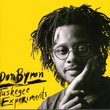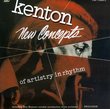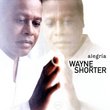| All Artists: Booker Ervin Title: Space Book Members Wishing: 5 Total Copies: 0 Label: Jvc Japan Release Date: 3/24/2006 Album Type: Import Genres: Jazz, Pop Styles: Modern Postbebop, Bebop Number of Discs: 1 SwapaCD Credits: 1 UPCs: 025218689625, 4988002500475, 090204501724, 498800250047 |
Search - Booker Ervin :: Space Book
 | Booker Ervin Space Book Genres: Jazz, Pop
|
CD DetailsSimilarly Requested CDs
|
CD ReviewsUnique Synergy A. K. L. | Steilacoom, WA USA | 04/01/2002 (5 out of 5 stars) "As others have said, this is an under-rated masterpiece. I would like to point out the extraordinary ensemble work of the trio comping for Booker Ervin. First, Booker's melancholy sound is the strange marriage of primordial blues-wail with avant garde harmonics. But behind him is something even more marvelous: Jackie Byard is as harmonically inventive as Monk in accompaniment. Richard Davis provides a contrapuntal melody, not just a bass line. And Dawson's drums are so melodic they are like another line of counterpoint. He doesn't just keep time, he enriches the ensemble with something like harmonic percussion. When you get this CD along with The Freedom Book, by the same ensemble, you have one of the true monuments of modern jazz. Why this ensemble isn't considered on par with Mile Davis' quintets or the John Coltrane Quartet is a great oversight. Booker's quartet is a single finely tuned instrument, whose whole is greater than the sum of its parts. It's the one group, other than the Modern Jazz Quartet, who has me listening to each instrument with equal attention. Superior and unique jazz..." Tenor titan Tyler Smith | Denver, CO United States | 03/28/2001 (5 out of 5 stars) "Booker Ervin possessed a powerful tenor sound, one that is immediately recognizable. This was no mean feat, seeing as how he was a contemporary of tenorists Coltrane, Rollins, Mobley as well as alto giants of the day such as Eric Dolphy, John Handy and many others. This 1964 release shows off his propulsive energy as well as his ability to sensitively explore ballads."Space Book" joins Ervin with three other great individualists: Jaki Byard, who like Ervin, had served in the bands of Charles Mingus; Richard Davis, one of the great bass creators of the day; and the fine drummer Alan Dawson, a frequent collaborator with Ervin. The powerful rhythmic attack that Ervin employed is displayed on the session's first track, "Number Two." His solos are dense and vertical, but I can always hear the R&B and blues roots in his playing. The fiery mood of "Number Two" is mellowed by the quartet's fine interpretation of "I Can't Get Started." Ervin here is sensitive to the contours of the melody, but he doesn't shy away from exploring the tune aggressively. In short, he walks the fine line between adherence to melody and the demands of improvisational freedom.Byard is terrific throughout. On "I Can't Get Started," he creates a great sense of space behind Ervin and then creates dreamy melodies in his own solo. Listen to his Monk-inflected backing of the tenor on "Mojo." It's as interesting as Ervin's solo, which is saying something, as the tenorist's solos here and elsewhere have enough power to cook with nothing else behind him.The set concludes at a slower tempo again with "There Is No Greater Love," which again finds Byard giving Ervin plenty of space in his accompaniment. Davis and Dawson too are not afraid to move about freely behind the soloist. Ervin plays passionately and lyrically, but with plenty of harmonic and rhythmic power. Great set closer.Like Coltrane, Ervin departed at the age of 40 with so much music left ahead of him. His was a singular jazz voice, one who bridged the older worlds of jazz and the new. Give him a listen." One of the Best Modern Jazz Albums Ever Michael B. Richman | Portland, Maine USA | 08/20/2000 (5 out of 5 stars) "If "The Space Book" was on Blue Note, it would be a bestseller. Booker Ervin of course did end up with a Blue Note contract in the late 1960s, but his best work was behind him at that point. That "best work" is the half-dozen or so albums he made for Prestige in the mid-60s, and particularly "The Freedom Book" and "The Space Book." Ervin's band of Jaki Byard, Richard Davis and Alan Dawson communicates almost telepathically, and it shows especially on the songs "Number Two" and "Mojo." There were some incredible albums made in 1964 -- "A Love Supreme," "Speak No Evil," "Point of Departure," "Song for my Father," etc. "The Space Book" should be included in that prestigious company."
|

 Track Listings (4) - Disc #1
Track Listings (4) - Disc #1


